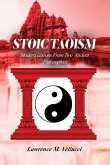When asked why some men with moderate talents and meagre technical equipment succeed, where others with greater ability and better preparation fail; why some women with plain features and few accomplishments charm, while others with all the advantages of beauty and cultivation repel, we are wont to conceal our ignorance behind the vague term personality. Undoubtedly the deeper springs of personality are below the threshold of consciousness, in hereditary traits and early training. Still some of the higher elements of personality rise above this threshold, are reducible to philosophical principles, and amenable to rational control. The five centuries from the birth of Socrates to the death of Jesus produced five such principles: the Epicurean pursuit of pleasure, genial but ungenerous; the Stoic law of self-control, strenuous but forbidding; the Platonic plan of subordination, sublime but ascetic; the Aristotelian sense of proportion, practical but uninspiring; and the Christian Spirit of Love, broadest and deepest of them all. The purpose of this book is to let the masters of these sane and wholesome principles of personality talk to us in their own words; with just enough of comment and interpretation to bring us to their points of view, and make us welcome their friendly assistance in the philosophical guidance of life. Why a new edition under a new title? Because "From Epicurus to Christ" had an antiquarian flavor; while the book presents those answers to the problem of life, which, though offered first by the ancients, are still so broad, deep, and true that all our modern answers are mere varieties of these five great types. Because the former title suggested that the historical aspect was a finality; whereas it is here used merely as the most effective approach to present-day solutions of the fundamental problems of life.








